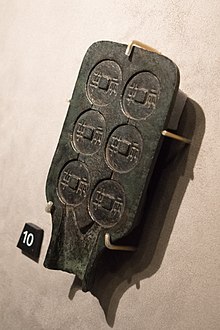Shen Dao
Shen Dao (c. 350 – c. 275 BC) was an early to mid Warring states period Chinese philosopher and writer.
Noteworthy as a predecessor to both Han Fei and Daoism,[1] his remaining fragments are the most substantial of any Jixia Academy scholar,[2] and may have been well known.
Although discussing reward and punishment, Shen Dao advocates their distribution more through impartial administrative mechanisms or standards (fa) than laws.
A critical reconstruction of the lost Shenzi was made by Paul Thompson, and published in 1979 as The Shen Tzu Fragments.
"[14] Whichever came first, Shen Dao and Laozi are at least partly comparable, including concepts of rule by wu wei or reduced activity of the ruler, as illustrated by translator Emerson.
Laozi 81, Making use of the term "Dao" without cosmological or metaphysical reference,[16] the Shenzi serves as noteworthy precursor to both Daoism and Han Fei.
[22] As opposed to the egoist Yang Zhu, Shen Dao is characterized by the Zhuangzi as impartial and lacking selfishness, his great way embracing all things.
Shen Dao rejects individual judgment, moral agents, sages, and, like other figures of the fa school, the "subjective intentionality of noble men."
Schwarz speculated that Shen Dao's philosophy similarly involves a ruler free from the turbulence of emotion or moral responsibility.
[26] Shen Dao discarded knowledge and renounced the self; he followed the inevitable and was indifferent to things... shifting and slippery, he changed about with circumstances.
Han Feizi Ch.40[31]Shen Dao's fragments also include illustrations of relying on water, which translator Harris takes as "reminding us" that the natural world has recognizable "qualities and patterns", whose actions can be predicted once understood.
[33] Although the Zhuangzi takes Shen Dao as rejecting sages and lacking in "standards of conduct",[34] he was otherwise content to leave questions of li (rites) to custom.
[39] He espouses an impersonal administration in much the same sense as Shen Buhai, and in contrast with Shang Yang emphasizes the use of talent[40] and the promotion of ministers, saying that order and chaos are "not the product of one man's efforts."
[41][42]However he challenges the Confucian and Mohist esteem and appointment of worthies as a basis of order, pointing out that talented ministers existed in every age.
Shen Dao eschews appointment by interview in favour of a mechanical distribution ("the basis of fairness") with the invariable Fa apportioning every person according to their achievement.
The way to control All-under-Heaven and the country lies solely in determining distribution.The greatest function of Fa ("the principle of objective judgement") is the prevention of selfish deeds and argument.
"[46] When an enlightened ruler establishes [gong] ("duke" or "public interest"), [private] desires do not oppose the correct timing [of things], favoritism does not violate the law, nobility does not trump the rules, salary does not exceed [that which is due] one's position, a [single] officer does not occupy multiple offices, and a [single] craftsman does not take up multiple lines of work ... [Such a ruler] neither overworked his heart-mind with knowledge nor exhausted himself with self-interest (si), but, rather, depended on laws and methods for settling matters of order and disorder, rewards and punishments for deciding on matters of right and wrong, and weights and balances for resolving issues of heavy or light ...[46] It is said: "When the great lord relies on fa and does not act personally, affairs are judged in accordance with (objective) method (fa)."
[53] Sun Tzu would go on to incorporate Taoist philosophy of inaction and impartiality, as well as punishment and rewards as systematic measures of organization, recalling Han Fei's concepts of power (shi) and tactics (shu).
[54] On the shi of The Art of War, relatable to Shen Dao's, Henry Kissinger says: "Chinese statesmanship exhibits a tendency to view the entire strategic landscape as part of a single whole... Strategy and statecraft become means of 'combative coexistence' with opponents.
[61] For Shen Dao, "Power" (Shih) refers to the ability to compel compliance requiring no support from its subjects, though it does not preclude this.
[62] Shen Dao says: "When All under Heaven lacks the single esteemed [person], then there is no way to carry out the principles [of orderly government, li 理]....
[64] Shen Dao says: "The flying dragon rides on the clouds and the rising serpent wanders in the mists.
But when the clouds disperse and the mists clear up, the dragon and the serpent become the same as the earthworm and the large winged black ant because they have lost what they ride.
Both morality together with intellectual capability are insufficient to rule, while position of authority is enough to attain influence and subdue the worthy, making virtue "not worth going after.


